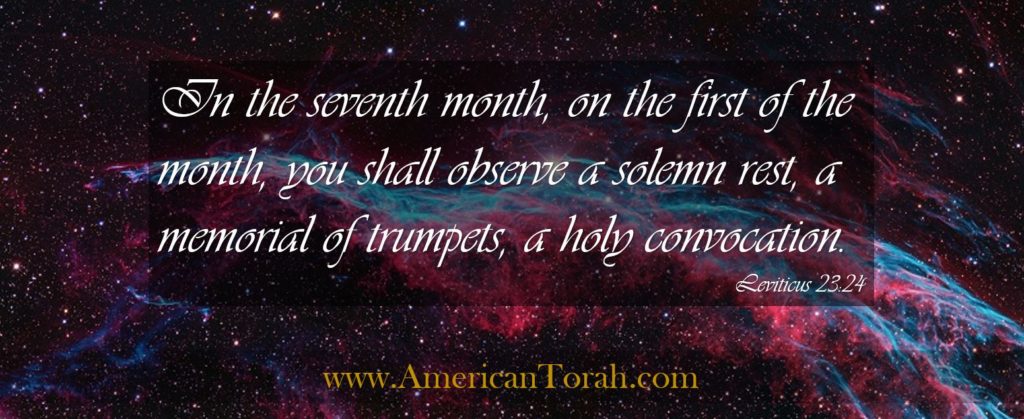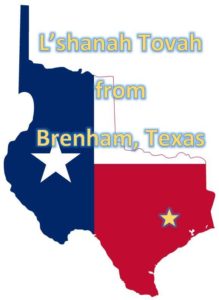
Everybody knows that Rosh Hashanah is the Jewish New Year, but it seems that few people know why (see here) and fewer still know the real meaning behind the day.
The primary source passages for the day are Leviticus 23:23-25 and Numbers 29:1-6.
“Speak to the people of Israel, saying, In the seventh month, on the first of the month, you shall observe a solemn rest, a memorial of trumpets, a holy convocation. You shall not do any servile work, and you shall present a fire offering to the LORD.” (Leviticus 23:24-25)
Like God’s other Appointed Times (moedim in Hebrew), Yom Teruah is to be a special day of rest, what’s commonly called a High Sabbath, and of sacrifices at the Temple. Most people understand the idea of a sabbath. You take a day off from work for resting and worship. Likewise with the sacrifices. Although the exact procedure and the purpose is a bit of a mystery, most people at least have some idea of what they are.
The thing that makes Yom Teruah different from all other moedim is the “memorial of trumpets”. The Hebrew word for trumpet in this passage is teruah, which more literally means “shouting”, but often means blowing trumpets or generally just making a lot of noise. Based on other passages and tradition, it is always translated as trumpets in relation to Yom Teruah. Specifically, these are to be the kind of trumpets that are called shofars and are made from the horns of clean animals like a ram.
So what is a memorial of trumpets? What are we supposed to remember? All of the moedim memorialize something. Passover recalls the plague of the firstborn in Egypt and how God spared those in houses marked by the blood of the lamb. Unleavened Bread recalls the hasty exit the Hebrews made from Egypt after the plague. Shavuot memorializes the giving of the Covenant at Sinai. And so on.
But… trumpets?
Again, what are we supposed to remember by blowing shofars? The Bible doesn’t specifically say, unless…unless it’s the trumpets themselves that we are to memorialize, more specifically, the sound of the trumpets. Okay, but does that really get us any closer to understanding the point?
It should help to look at how trumpets and horns appear in other places in Scripture.
- In Genesis 22:13, God provided a ram caught in a thicket by its horns that Abraham could use as a burnt offering instead of his son, Isaac. Rabbinic tradition says that this happened on the date of Yom Teruah.
- As battle cries, to signal attack, or to celebrate victory. (Numbers 31:6, Joshua 6, etc.)
- To call the people to gather or to signal the moving of the camp in the wilderness. (Numbers 10:3,5)
- To announce the arrival of a king or the Ark of the Covenant. (Numbers 23:21, 1 Samuel 4:5-6, Matthew 24:29-51, etc.)
- To announce the arrival, descent, or descent of God. (Psalm 47:5, 1 Thessalonians 4:16, etc.)
- The voice of God. (Exodus 19:16,19, Numbers 23:21, etc.)
This last one is what I find most interesting. God’s voice sounds like a shofar! What is it about God’s voice that we should remember?
God created the world and everything in it with his voice. Jewish tradition says that Yom Teruah is the anniversary of the creation of Adam and Eve, who were the first things that God didn’t create by speaking them into existence. Instead, they were formed by his hands and filled with his breath. (Kind of like a shofar. Hmm…) They weren’t present to witness God creating with his voice, so he had to give them a day, Yom Teruah, to look back at what they couldn’t otherwise see.
God gave the Sinai Covenant and the Torah with his voice. Certainly remembering the covenant and keeping its terms is very important. Another tradition says that, if the Israelites had been able to stand the direct communication with God at Sinai, they would have received the Law written on their hearts at that moment. Since they could not, God gave a special day to make sure they continued to look back at that moment. Jeremiah 31:31-34 says that one of the defining features of the New Covenant is the Law written on hearts instead of stone, so that Yom Teruah also calls Israel to remember that day, which has been promised and paid for, but not yet fully delivered.
Yeshua’s return will be announced by a great shofar. The arrival of a king is announced by a shofar. How much more so, the arrival of the King of Kings? This could very well be the voice of God himself, a great battle cry from heaven calling his people to assemble and announcing the beginning of the Day of the Lord.
What then does Yom Teruah memorialize through the blowing of trumpets?
The shofar on Yom Teruah calls us to repentance, to hear and obey the Voice of God.
Remember the Creator who spoke the universe into existence. Remember the substitution of the ram for Isaac and the Lamb for all of us. Remember the Covenant. Remember the commandments. Remember the King, who was, who is, and who is to come.
The Lamb’s Book of Life will not remain open forever. Repent from all transgression of the Law, for the Kingdom of Heaven is now, and the King has promised to return.


